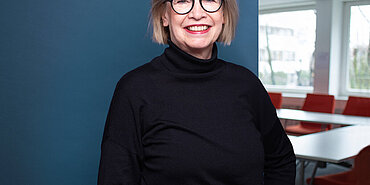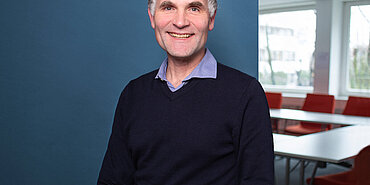ijab.de: Mr. Şenyuva, in preparation for this interview I took a look at Turkish corona statistics and was shocked by the sudden increase in the last few days. What has happened?
Özgehan Şenyuva: Nothing has happened - except that the government counts differently now. So far, only cases that are medically treated have been recorded. Now all cases of infection are recorded for statistics. So we have to assume that the number of infections has been so high for a long time.
ijab.de: How does the pandemic affect young people in Turkey?
Özgehan Şenyuva: It is mainly a loss of opportunities. Schools are closed and teaching has been switched to online formats. Quality suffers from this. The digital divide deepens and leads to educational injustice. Young people are losing some of their educational opportunities.
We also have restrictions in public life. In the lockdown, the house can only be left between 1 and 4 pm. This means that a large part of social life is lost, as well as non-formal education and informal learning. Formal education under online conditions means: the teacher is on the screen, there is no before or after. In the past, people laughed together before the lesson, they ate together, exchanged ideas with peers. These are all important elements of non-formal education. We learn from friends, we learn about our strengths and weaknesses. It's like being on a football team. You learn from the other players. The acquisition of skills is now clearly limited.
ijab.de: Is the government aware of this?
Özgehan Şenyuva: No, it is trying to put out the fire in the formal education system. The importance of out-of-school youth work has only been understood to a limited extent so far.
The economic situation of young people is also affected. Part-time jobs or temporary jobs in cafés and restaurants have disappeared. The possibility of earning a little money through extra tutorship no longer exists either. We are facing high youth unemployment. We also register risks for mental health. Many young people have moved back to their parents due to a lack of money. This delays their transition into adulthood. When you leave home, you have to learn to take responsibility. You have to take care of all the everyday things - shopping, cooking, cleaning. All that is no longer given.
ijab.de: What about youth exchange? Given the difficult political conditions between Germany and Turkey, it has been in crisis for quite some time. Has it now come to a complete standstill or are there still prospects?
Özgehan Şenyuva: Covid really came at a bad moment. It's true, the numbers in exchange were down, but they had started to recover. This positive trend has been broken. As far as the future of youth exchange and youth work is concerned, one first has to look at the organisational level. It has been severely affected by the Corona pandemic, because many out-of-school and school exchanges or work camps had to be cancelled. Many youth organisations are therefore no longer able to cover their costs - electricity, water, rent. They also lose volunteers, because they are no longer allowed to leave the house. Some organisations will disappear.
Furthermore, the loss of international networks is to be feared. How long can a network be maintained if there is no exchange? After two years at the latest, this will have negative effects.
In the end, the participants will also be lost. We know from many studies that word of mouth is the best advertisement. Someone has heard from a friend how great the exchange experience was and wants to take part next year. That no longer happens now. Maybe this experience will be lost for a whole generation. With the loss of the exchange we also lose trainers, facilitators and work camp leaders.
In addition, the Turkish economy is in a bad way and this has consequences for the co-financing of projects. A grant of 10,000 euros has become a huge sum for a city administration. The Turkish lira has lost two thirds of its value against the euro. This has an impact on the purchase of air tickets, for example. They have become unaffordable and the risk of not being reimbursed in case of cancellation is high. Even for exchanges in Germany, the poor lira exchange rate has negative effects: If you buy a bottle of water there, it is like buying a burger in Turkey.
Turkish citizens have to show a corona test when entering an EU country - and they have to pay for it themselves. Vaccines? Yes, they will come eventually, but who will have access to them? I fear a new form of exclusion.
We won't get rid of the virus so quickly and even if physical exchanges do take place again, it will affect eating together, parties or rooms for group activities. How will young people be accommodated in host families? How should an intercultural evening take place? Everything will need extra time and money and we will have to learn many new things.
We are facing another problem: I call it Corona nationalism. Chinese students already say they are Japanese in order to avoid hostility. These hostilities can quickly spread to Erasmus students and follow the racist stereotype that diseases are transmitted from foreigners and outsiders.
ijab.de: IMECE.LAB, an online conference on German-Turkish youth exchange, will take place on 8 December. What hopes and expectations do you associate with it?
Özgehan Şenyuva: The event is perfect to examine the current situation. We can develop something that we can implement. We can share our exchange experiences and show good practice examples. It is important that young people are involved in the event. How often have we heard in recent months that young people are part of the Corona problem? In fact they are part of its solution. They look after the neighbours, go shopping for them, walk their dog and look after the children.
IMECE.LAB is a conference for multipliers - this way we achieve a snowball effect. And we can learn from each other. I particularly like the title, because imece means "doing something together".
The online format is also important, because the future lies in hybrid formats and methods. It won't work right away, but it will help us to work in a more cost-efficient and environmentally friendly way.




